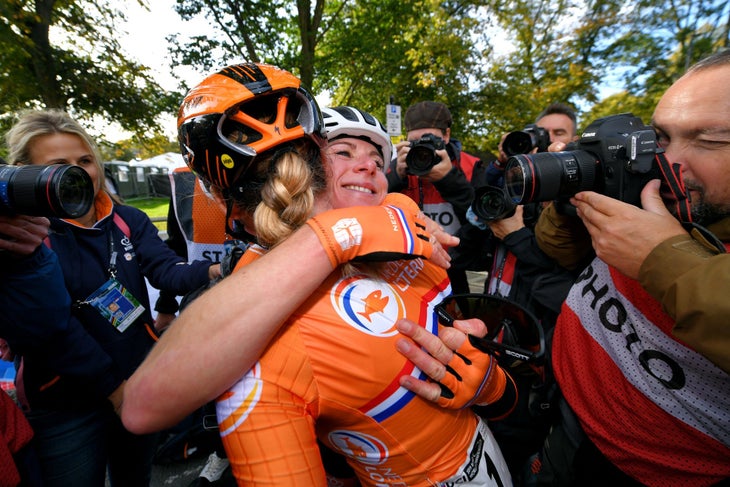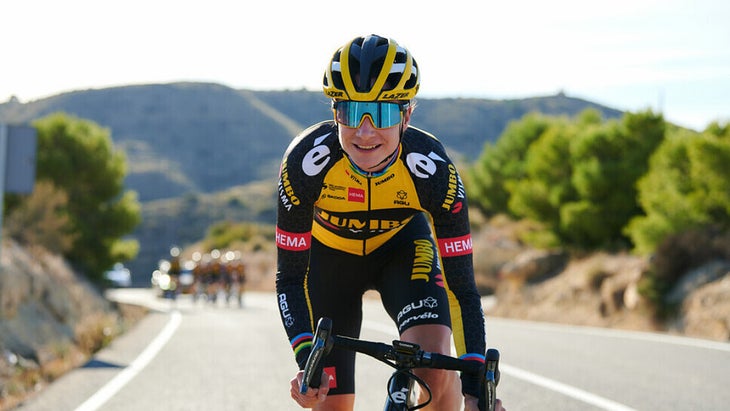Heading out the door? Read this article on the new Outside+ app available now on iOS devices for members! Download the app.
Check the results sheet in any major women’s race, and there’s a pretty good chance a Dutch rider will be at the top.
Just look at how things have gone so far in 2021: Omloop Het Nieuwsblad, Anna van der Breggen. Strade Bianche, Chantal van den Broek-Blaak. The past four world champions? Dutch. See a trend?
Of course, Dutch riders do not win every race, but it’s also very true they win a lot. So what’s going on?
There are several reasons why women’s racing thrives in the Netherlands. A big part of it is cultural. Bikes, cycling and racing are as much a part of the cultural landscape as canals and windmills.
“I think the Netherlands is a big cycling country,” Amy Pieters (SD Worx) told VeloNews‘ Fred Dreier. “When you’re 8 years old, you can already race every weekend.”
https://twitter.com/UCI_cycling/status/1309858111931514880?ref_src=twsrc%5Etfw%7Ctwcamp%5Etweetembed%7Ctwterm%5E1309858111931514880%7Ctwgr%5E%7Ctwcon%5Es1_&ref_url=https%3A%2F%2Fcyclingmagazine.ca%2Fsections%2Fnews%2Fanna-van-der-breggen-helicopter%2F
Cycling is ingrained into the sports landscape of the Netherlands. The federal government not only invests hundreds of millions into cycling infrastructure across the nation, the Dutch cycling federation also has one of the largest budgets in Europe, backed by funds from the national lottery and Dutch Olympic Committee.
Bike paths ply the nation, and there’s a strong cultural link to bike racing. In some countries, young kids might play soccer or basketball. In Holland, it’s more likely that youngsters will get on the bike and race every weekend.
Race report: Chantal van der Broek-Blaak wins Strade Bianche
“In Holland, you have all of these races around the town church, like critériums, and we also had races for school kids,” explained van der Broek-Blaak (SD-Worx). “You can race one lap on your normal bike, and I had a basket in front of me and I won that race.
“I was just riding fast on a city bike and I started to like it, and I did another race, and I won again,” she explained. “I could go to the final in the regional, and I won that final and got first prize, and the prize was a one-year membership to the regional cycling club. That’s how I started. My parents said if you like it, you can try it. They had nothing to do with cycling. I rented my first racing bike and I liked it.”
Van der Broek-Blaak since emerged as one of the top Dutch pros, winning the world title in 2017, the Tour of Flanders in 2020, Amstel Gold Race in 2018, and Strade Bianche last weekend.
Highly competitive national team pushes level higher

Another key factor is deep institutional support among private and public sectors for women’s sport in the Netherlands. The Dutch national cycling team has strong financial backing to bring competitive teams to international competition across track, mountain bike, cyclocross, BMX, and road disciplines. That commitment helps build the grassroots, and it eventually spills over into the pro ranks.
And Dutch companies have a long-running track record of supporting professional cycling teams, so when promising riders turn professional, they can often land at Dutch-backed teams.
Also read: Inside the tactical masterpiece at Strade Bianche by SD-Worx
And because the Dutch cycling talent pool is so deep, it’s also a big fight to simply get a spot on the national team. That, in turn, not only fuels a higher level at the Olympic Games and world championships, but also in the season’s major pro races.
“They made a good direction at the national federation and they really support women’s racing,” said SD Worx sport director Danny Stam. “Now they are all pushing each other to a higher level. If you are on the Dutch national team, you know you have a very good chance of winning the world title or Olympic gold medal. Right now, everyone is pushing each other higher, and they are also big rivals.”
Dutch companies have also backed women’s pro teams for years, from Rabobank to Boels and Dolmans to SD Worx, an international human resources company that has signed on to sponsor the women’s team through 2024.
Also read: SD-Worx steps in as new sponsor
Indeed, in every major pro race, it’s more often than not that van der Breggen and van Vleuten are squaring off. Other teams and nationalities are certainly in the mix, but the Dutch are enjoying an unprecedented run over much of the past decade.
It’s that combination of strong support at the national and private level, coupled with a deep and highly competitive national field that helps to add up to Dutch success.
“If you had 10 good riders and only eight on the worlds team, you need to battle with each other to be selected for worlds,” Pieters said. “That makes the level really high, but also I think it’s so normal to be cycling in the Netherlands. If you are a good junior, they take care of you for the national team.”
A direct line from Leontien van Moorsel to Marianne Vos to today

Raymond Kerckhoffs, a cycling journalist who’s been covering Dutch cycling for decades, said there is a direct line from Leontien van Moorsel, who won three gold medals in the 200o Olympic Games, to Marianne Vos, who emerged a decade ago as a precursor to the latest Dutch boom. The creation of the women’s Rabobank team, where Vos raced 2012-16, also helped ferment the Dutch domination.
“Vos was at her highest level when she was on the team. All the others were pushing their own level even higher because Vos was there,” Kerckhoffs said. “Van Vleuten, van der Breggen, all the others, they all learned a lot from Vos, and were inspired by her.”
Also read: Marianne Vos is a living legend
Like van Moorsel before her, Vos was the rider everyone wanted to be. Nearly everyone winning races now drew inspiration and guidance from Vos.
“I looked up to her,” van der Broek-Blaak said of Vos. “Every year we had an international training camp in December and I could come with the federation when I was young, like 18. They invited me and I could join and they teach me things and training. I grew up around Vos and the others, and you see how they eat, how they train, how they sleep. It’s so important to learn.”
With the likes of Vos, van Vleuten and van der Breggen all fighting for spots on the national team — those three riders own five rainbow jerseys between them — the math was easy. In order to make the national selection, a rider had to be among one of the best riders in the world.
It’s self-perpetuating circle that continues to feed Dutch success across international and professional racing.
“It has made me who I am as a rider. I’m that strong because you always need to fight to be there in the Netherlands and to be one of the best riders,” said Lucinda Brand (Trek-Segafredo). “I remember my first world championship TT, in Innsbruck. We had four spots, and I came in sixth overall, but I was the fourth from my country. It was an excellent result, and something to be proud of, but still I was still the fourth-best from The Netherlands. It’s actually ridiculous.”
Also read: Everyone wants to be the first to win Paris-Roubaix
Ridiculously good, and it could continue for a few more years. Behind the likes of veterans and flag-bearers Vos, van der Breggen and van Vleuten, there is another generation of orange jersey-clad youngsters waiting in the wings.
— Fred Dreier contributed to this report.